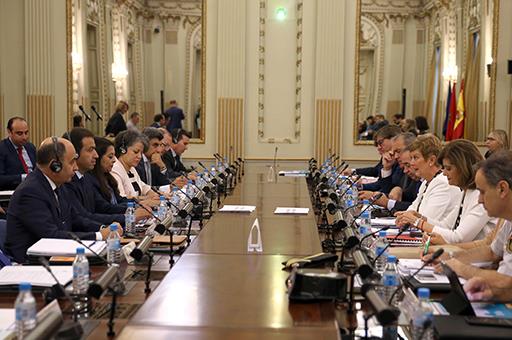19th meeting of Spain-Morocco Standing Group on Migration
Governments of Spain and Morocco highlight collaboration between their two countries on managing migratory flows
News - 2019.9.26
The Governments of Spain and Morocco highlighted on Thursday the primordial role of bilateral collaboration between Spain and Morocco in managing migratory flows, together with the need to continue encouraging orderly and safe legal immigration channels. These observations were the clear outcome of the 19th meeting of the Spain-Morocco Standing Group on Migration, held on Thursday in Madrid.
The meeting was attended by the State Secretary for Migration, Consuelo Rumí, and the State Secretary for Security, Ana Botella. The Moroccan delegation was headed up by the Director for Migration and Border Surveillance of the Kingdom of Morocco, Walli Khalid Zerouali.
The meeting - the 19th of the Spain-Morocco Standing Group on Migration since it was set up in 2003 - served to analyse the development of migratory movements over recent months and ways to strengthen collaboration between the two countries.
The meeting was used to address such issues as border surveillance, the fight against illegal people trafficking and encouraging orderly and safe legal immigration channels through measures such as the joint management of recruitment at source and the implementation of post-graduate training programmes in Spain for young Moroccans.
Commitment to safe, orderly and regular migration
In her speech, the State Secretary for Migration, Consuelo Rumí, pointed to Morocco "as a privileged and indisputable partner for Spain in the joint management of the migratory phenomenon", and thanked the neighbouring country for the efforts it carries out to control illegal immigration.
Consuelo Rumí highlighted that the "pillars of the migratory policy of both countries must be guided by the principles of the Global Compact for Safe, Orderly and Regular Migration", adopted in December last year in Marrakesh. In this regard, she stated that Spain is working with Morocco to consolidate legal immigration channels. Among these channels, Consuelo Rumí mentioned the red fruit picking harvest, which brought more than 14,000 women to Spain in its last edition to work on agricultural holdings.
Spain has also backed a pilot project with European funding for the establishment of migratory opportunities related to the transfer of knowledge. This programme is entitled "Young generations, agents of change", thanks to which 100 Moroccan post-graduate students will shortly study at Spanish universities in key sectors for Morocco, with the commitment that, once their studies are over, they will return to their own country to set up projects aimed at promoting economic and social development.
Consuelo Rumí also stressed the importance of integration policies. To that end, the State Secretariat for Migration is working on a new Strategic Citizenship and Integration Plan, which will incorporate the vision that migrants have on integration processes. In this regard, she recalled that migrants from Morocco play a key role in our country.
Lastly, she spoke about the project entitled "Living side-by-side without discrimination: a focus based on human rights and gender". The aim of this project (lasting three years with a budget of 5.5 million euros) is to strengthen Moroccan stakeholders in the implementation of initiatives to prevent racism and xenophobia towards migrants in the Kingdom of Morocco.
Fight against people trafficking networks
For her part, the State Secretary for Security, Ana Botella, expressed her satisfaction at the excellent level of cooperation between Spain and Morocco in this field and at the firm commitment shown by Morocco in controlling illegal migratory flows.
This is all framed within the migratory policy of mutual support, confidence and consensus that has led to a reduction in the total number of illegal arrivals to Spain by 46.9% in 2018 and 51.3% in arrivals by sea (at 22.09.19 compared with the same period of 2018).
The State Secretary for Security also underlined the involvement of the Moroccan authorities in avoiding the loss of human life in the Mediterranean Sea. Using its own resources, Morocco has saved the lives of some 10,700 people in 2019, according to the Moroccan authorities.
The joint operational work between the Spanish law enforcement agencies (National Police and Guardia Civil) and the Moroccan law enforcement agencies (Police, Royal Moroccan Gendarmerie and Auxiliary Forces) was another of the points stressed by the State Secretary for Security as a key element in the fight against people trafficking networks and the suitable management of illegal migratory flows. Some examples of the excellent cooperation are joint maritime, land and air patrols, and the fluid exchange of information on people trafficking networks.
This commitment between neighbouring countries, friends and strategic partners can be witnessed by the State visit by H.M. King Felipe VI to Morocco on 14 February 2019 at which he had the chance to express his support for the National Immigration and Asylum Strategy pushed through by King Mohammed VI.
To end, the State Secretary for Security underlined Spain's support for Morocco in its relations with the European Union, where our shared success story in this field constitutes a model to emulate and an important pillar in the construction of the European migratory policy.
Non official translation





